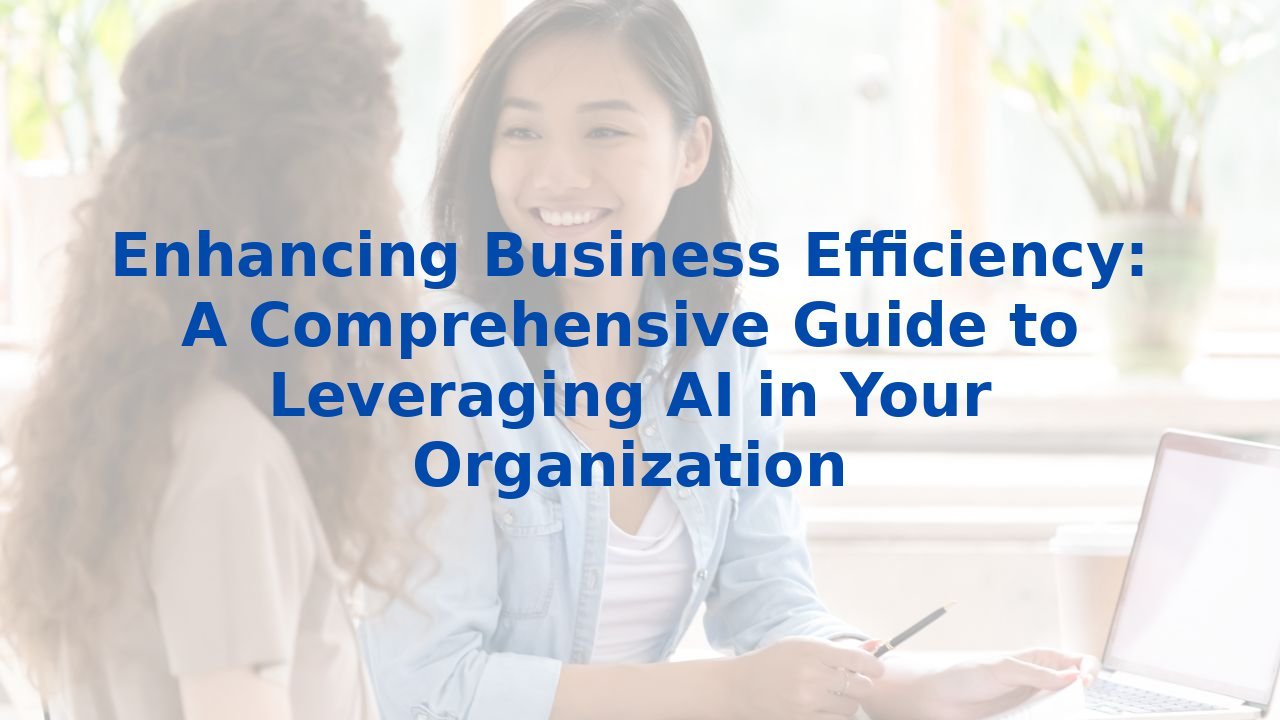Enhancing Business Efficiency: A Comprehensive Guide to Leveraging AI in Your Organization
Enhancing Business Efficiency: A Comprehensive Guide to Leveraging AI in Your Organization
In an era of relentless competition and heightened customer expectations, organizations are on a continuous quest for enhancement. Enter Artificial Intelligence (AI)—a transformative tool that not only streamlines operations but also redefines agility, precision, and innovation. This guide will illuminate the myriad ways AI enhances business processes, emphasizing its profound benefits in cultivating efficiency within your organization.
1. Streamlining Meetings
Meetings have long been the backbone of corporate decision-making, yet they often stagnate in administrative drudgery. Imagine replacing the mundane tasks of scheduling and note-taking with intelligent automation. AI-driven voice assistants can handle appointment scheduling effortlessly, while tools designed to capture and summarize meeting highlights can make follow-ups and actionable insights readily available. This revolutionizes the way teams engage, freeing them to focus on what truly matters—strategy, collaboration, and execution.
2. Elevating Sales and Marketing
For sales teams, data reigns supreme—and AI is the master of analytics. By processing vast sets of data, AI uncovers patterns that can predict customer behavior and tailor approaches accordingly. This predictive power not only identifies high-potential sales opportunities but also mitigates churn risks. Moreover, intuitive chatbots enable personalized customer experiences that can lead to significant revenue growth without exhausting human resources. With AI guiding the way, the landscape of sales and marketing becomes a playground of possibilities.
3. Enhancing Customer Service
Customer service is the lifeblood of any organization, and AI can redefine how companies deliver it. Automated systems have paved the way for more efficient call management, but gaining insights into human interactions elevates the game further. AI can assess call quality to highlight areas in need of improvement, enabling a relentless pursuit of excellence. This not only bolsters customer satisfaction but also cultivates loyalty—key to long-term success.
4. Accelerating Product Development
The journey from concept to product can be arduous, but AI shines in transforming this process. Generative design software leverages AI algorithms to explore design possibilities that meet specified criteria, drastically reducing iterative cycles typically required for prototyping. Companies can now bring innovative products to market faster, keeping them ahead of competitors while conserving valuable resources.
5. Automating Content Creation
In the digital realm, content reigns supreme—but generating it can be labor-intensive. Fortunately, AI can automate content generation. From product descriptions to comprehensive reports, AI-enabled tools make creating substantial volumes of high-quality content a reality. This not only cuts down on time but also enhances consistency and coherence across marketing materials. Imagine redirecting your creative energy towards ideation while AI handles the execution!
6. Manufacturing with Intelligence
AI is a powerful ally on the manufacturing floor. Enter cobots—collaborative robots that work harmoniously alongside human operators. With AI-driven machine vision, these cobots optimize workflows by adjusting in real-time to human presence, ensuring safety and efficiency. This seamless integration redefines productivity while maintaining a human-centric approach in the workplace. The agile manufacturing of the future is here, and it’s powered by AI.
7. Innovating Recruitment Processes
Hiring the right talent is crucial in carving a competitive edge. AI significantly enhances recruitment efforts through streamlined resume screening and intelligent scheduling of interviews. By analyzing vast datasets and recognizing patterns, AI helps organizations make informed hiring decisions, allowing HR teams to focus on building relationships rather than sifting through spreadsheets.
The Role of AI in Business Process Management
The integration of AI into Business Process Management (BPM) is nothing short of revolutionary. Here’s how it can be harnessed:
1. Process Discovery
AI employs sophisticated techniques like process mining to unveil existing workflows, exposing inefficiencies that would otherwise elude scrutiny. The ability to analyze massive datasets rapidly is invaluable in optimizing operations.
2. Process Mapping
Dynamic process mapping generated from real-time data analysis creates clear visual representations of current workflows, ensuring that documentation remains up-to-date and actionable.
3. Process Automation
AI-driven automation handles repetitive tasks efficiently, empowering employees to channel their energies into higher-value duties. Tasks such as invoice processing or employee onboarding can now be neatly managed by intelligent bots.
4. Process Management
With real-time monitoring capabilities, AI ensures that potential issues are flagged immediately, providing businesses with the agility to troubleshoot and capitalize on opportunities.
5. Continuous Improvement
AI’s ability to derive insights from historical data leads to sustainable process improvements, arming organizations with the tools to adapt and thrive in a constantly shifting business landscape.
Benefits of Training Employees in AI
Integrating AI into your organization goes beyond technology; it involves empowering your workforce. Here’s how training your employees to work with AI can amplify your initiatives:
- Enhanced Collaboration: Employees equipped with AI knowledge can seamlessly engage with intelligent systems, facilitating better teamwork and delivery.
- Improved Decision-Making: Trained individuals can glean actionable insights from AI-generated data, making informed choices that align with organizational goals.
- Adaptability: A knowledgeable workforce can swiftly navigate evolving technologies, ensuring that your organization remains agile and resilient.
- Reduced Errors: Understanding AI systems allows employees to catch potential errors, fostering a culture of accuracy and quality.
Conclusion
The integration of Artificial Intelligence into business processes is not just a trend; it’s a strategic imperative. From enhancing meetings and refining customer interactions to revolutionizing recruitment and manufacturing, AI is primed to elevate operational efficiency. Training employees to harness the full potential of AI creates a symbiotic relationship where human intelligence complements machine learning, resulting in remarkable outcomes. As businesses continue to evolve, embracing AI is not merely an option—it’s the future.



